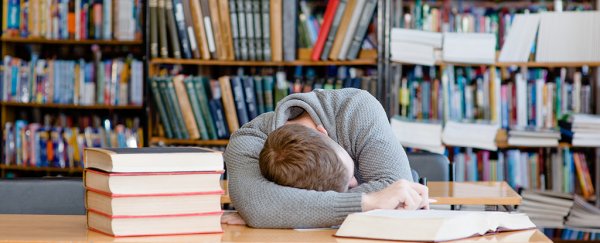If you've got an important exam coming up, it might seem like a bad idea to waste your time snoozing, but a new study suggests that a nap could be even better for your memory than extra revision.
While the researchers aren't exactly sure why this is, they think it's something to do with the way sleep reinforces our memories – whereas cramming may be ineffective for memorisation in the long run.
A team from the Duke-NUS Medical School in Singapore recruited 72 volunteers, who were taught about an unfamilar topic for 80 minutes – various ant and crab species.
The participants were then split into three groups and could choose what they did for the next hour – either watch a movie, take a nap, or revise what they'd seen in the lesson – before engaging in another 80-minute lesson on the topic.
After the second lesson, the participants were tested on what they'd learned, and it was the nappers who got the highest scores.
In a repeat of the experiment a week later, the nappers came out with the top scores again, although the researchers acknowledge that in the second test, the slight edge the nappers had over the crammers may not have been statistically significant.
Another interesting finding is that while the the crammers outperformed the movie-watchers in the first test, in the second experiment, the crammers and the movie watchers scored about the same.
"It could indicate that cramming information might be good in the short term, but in the long run, the benefits might not be that great," lead researcher James Cousins told Jessica Hamzelou at New Scientist.
His advice for students is simple, though: "Don't stress yourself out just cramming some information into your head," he says. "Taking a nap is just as good."
But due to the small size of the study and the narrow gap between nappers and crammers in some of the results, the researchers acknowledge we shouldn't draw definitive conclusions from the study, explaining that bigger studies with more participants would be needed to verify the findings.
That said, the link between sleep and a boosted memory is already well established, whereas cramming, as a form of shallow information processing, is acknowledged to only work for short-term recollections.
A 2015 study where participants were tested on made-up words found that sleep almost doubled the chances of people being able to recall memories they couldn't bring to mind before they dozed off.
And Brazilian research from last year showed that sleeping helps to both strengthen and weaken synapse connections in the brain, apparently ditching the memories we don't need while clinging on to those we do.
In any case, it's important not to forgo sleep for extra study time, as there's no way you'll get better results if you're not well-rested. A 2012 study by researchers at UCLA involving involving more than 500 high-school students found that longer study hours actually caused academic problems.
"Although we expected that cramming might not be as effective as students think, our results showed that extra time spent studying cut into sleep," said researcher Gillen-O'Neel at the time.
"And it's this reduced sleep that accounts for the increase in academic problems that occurs after days of increased studying."
The new study, while small, adds weight to this argument that napping either helps us bring back what we've learned or makes us more alert and ready for further study.
In other words, before you trade in your textbooks for an upgraded pillow, just remember that the nappers in the study only did well when they combined sleep with thorough study sessions – so you can't ditch your syllabus completely.
As for Cousins and his team, the researchers say they have no doubt that afternoon naps are the best way to stay focussed on their work.
"We do it in our lab," Cousins says. "Napping is encouraged."
The findings were presented at the Society for Neuroscience annual meeting this week.
